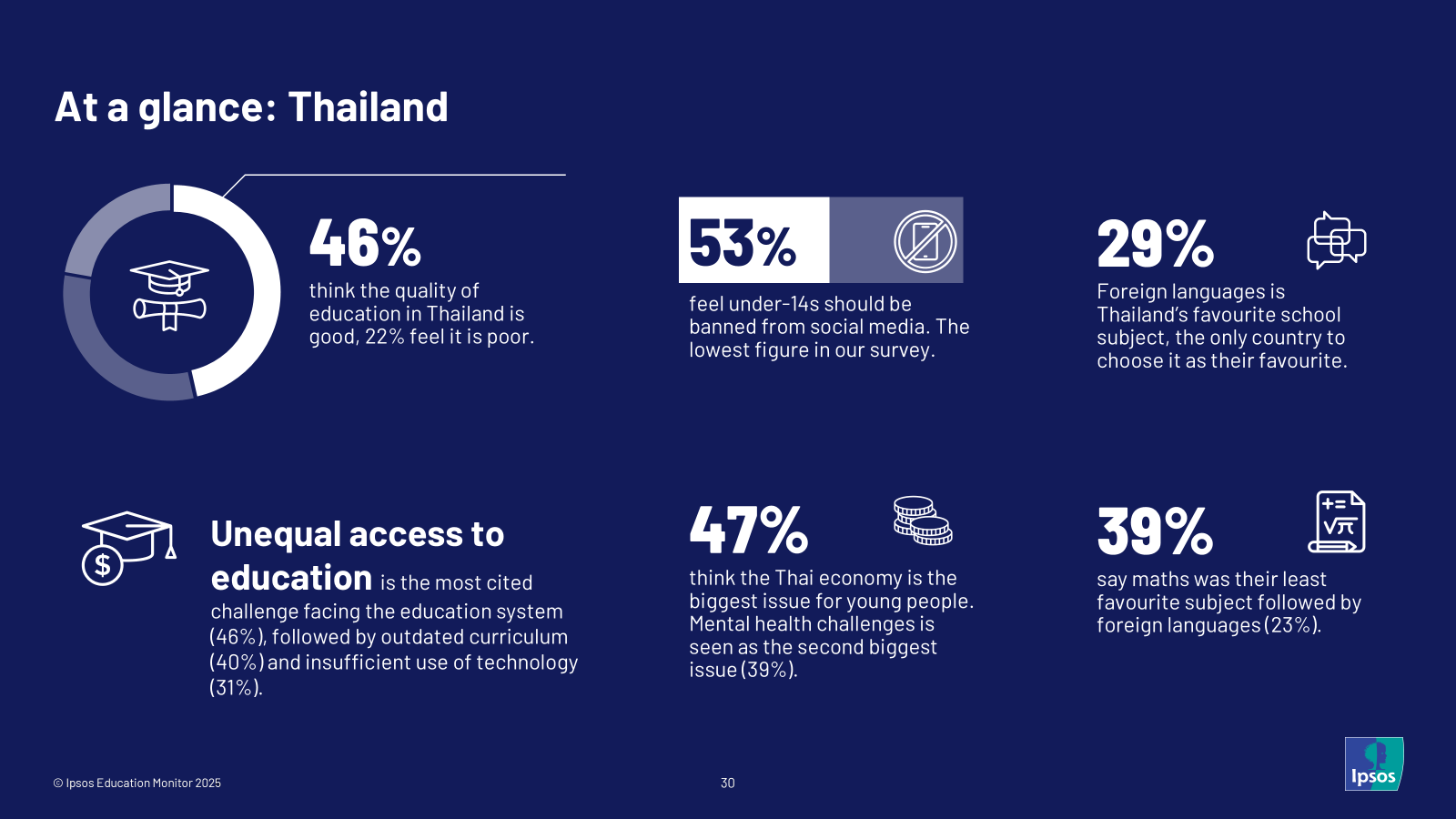Thailand's Educational Crossroads: Insights from the Ipsos Education Monitor 2025
The Ipsos Education Monitor 2025, a comprehensive 30-country global survey, highlights Thailand as a nation with a relatively positive view of its education quality, yet grappling with significant concerns about inequality, economic pressures on its youth, and a uniquely lenient public stance on social media use for children.
A Mixed Report Card on Education Quality
When it comes to the overall quality of the education system, Thais are on the more positive side. Nearly half of Thais (46%) perceive the quality of education in the country as good, while only 22% view it as poor. This is a more favourable view compared to the 30-country average, where only 34% rate their education system as good and 35% believe it is poor.
However, when benchmarked against some of its APAC peers, there is a noticeable gap. For instance, in Singapore, a commanding 77% of respondents rate their education system as good. Similarly, Ireland also shows strong public confidence with 71% viewing its education quality positively.
Identifying the Hurdles: Access, Curriculum, and Youth Well-being
Top Challenges for the Education System
The survey asked respondents to identify the greatest challenges facing their country's education system. For Thais, the most pressing issue is unequal access to education, cited by 46% of respondents. This is followed by concerns over an outdated curriculum (40%) and an insufficient use of technology in schools (31%). These figures highlight a public desire for a more modern, equitable, and technologically integrated educational framework.
The Broader Struggles of Thai Youth
Beyond the classroom, the report sheds light on the major challenges confronting young people today. In Thailand, economic anxieties are front and center, with 47% of Thais believing the country's economy is the biggest issue for young people. This concern for economic stability and job prospects appears to be a dominant factor shaping the youth experience.
Mental health challenges, such as depression and anxiety, are seen as the second-biggest issue, with 39% of Thais identifying it as a major concern. This reflects the global findings where mental health ranks as the number one challenge for young people on average (34%).
A Unique Stance on Social Media Bans
One of the major global headlines from the 2025 report is the widespread and growing support for regulating social media access for children. Across all 30 countries, a majority supports banning social media for those under 14, with the global average for this sentiment standing at 71%.
In a striking deviation from this global trend, Thailand shows the lowest support for such a ban among all countries surveyed. Just over half of Thais (53%) feel that under-14s should be banned from social media. This figure is dramatically different from other APAC countries like Indonesia, which has the highest support for a ban at 87%, and Australia, which recently became the first country to legislate a ban for under-16s.
Thais' Taste in School Subjects
The report reveals a unique academic preference among Thais. In a finding exclusive to the nation, Foreign Languages emerged as Thailand’s favourite school subject, chosen by 29% of respondents. Thailand is the only country in the entire 30-country survey to select it as the top choice. This is a significant departure from the global top three favourite subjects: History (32%), Maths (30%), and Science (26%).
However, the relationship with this subject is complex. While it is the most-loved, Foreign Languages also ranks as the second least-favourite subject for 23% of Thais. The undisputed least-favourite subject in Thailand is Maths, with 39% of respondents listing it as the one they disliked the most at school.

The Ipsos Education Monitor 2025 paints a complex and detailed picture of Thailand's education sector and the environment for its youth. There is a clear public mandate to address fundamental challenges of inequality, modernise the curriculum, and better integrate technology.
Furthermore, the pronounced economic anxiety among youth and the nation's outlier status on social media regulation present unique considerations for policymakers. These findings provide a crucial evidence base for educators, government bodies, and families as they work together to shape a prosperous and healthy future for the next generation in Thailand.



